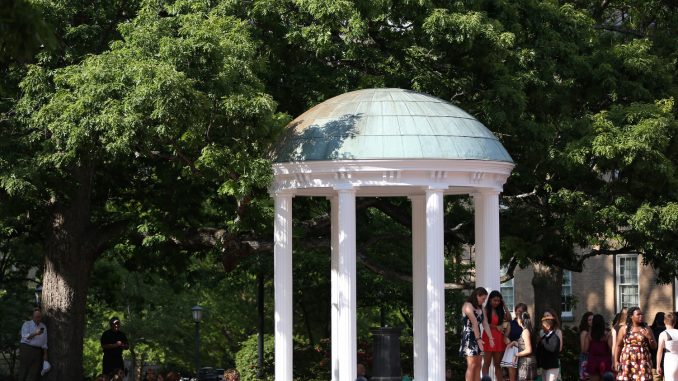
CHAPEL HILL — On Thursday the UNC Board of Governors passed four key resolutions that included lowering tuition and 45-day studies on moving the governing General Administration body out of Chapel Hill and evaluating its scope. Board member and former Republican state Sen. Robert Rucho would chair the committee to evaluate the role of the UNC General Administration.
“We want to be completely transparent about this organization, which is 260 or so people and a $65 million organization,” UNC President Margaret Spellings told the board. “We look forward to showing very detailed information about how we spend our time.”
While the issues tackled by the board last week were big news, the general mood of the members reflected frustration over communication problems within the membership. Last week, a group of 15 members sent a letter to Gov. Roy Cooper criticizing UNC Spellings and Board of Governors Chairman Louis Bissette for requesting assistance ahead of a planned Silent Sam protest in the days after the Charlottesville violence. The letter said the entire board should have been consulted before UNC Chancellor Carol Folt reached out to the governor.
Other board members said they too should have been consulted before the 15 members sent the critical letter.
“In all the years I’ve been here I’ve never seen a letter written like yours that all the board was not involved in. I knew nothing about the letter until I got it,” said UNC Board of Governors member Frank Grainger. “When you put something like that in black and white it becomes very official. … We need to really think about how we handle these things going forward.”
The recent high-profile shifts on the Board of Governors has come after decades of criticism by those who say it was too liberal, too set in its ways, and too UNC Chapel Hill-focused. New members, elected by the N.C. General Assembly, have included more graduates of other UNC campuses across the state, and three Republican former members of the legislature.
“I do support the new folks coming around with new ideas, because the right answer is not ‘that’s the way we’ve always done it.’ Times have changed,” said member Phil Byers.
The issue of ideology came up particularly in discussing moving the General Administration to either to Research Triangle Park or the state capital in Raleigh, something that has been periodically discussed for more than 20 years.
“I realize that Chapel Hill has a reputation of being a hotbed of liberalism and people are trying to tear down Silent Sam and all these things are going on; we have protests out there and our meetings are disrupted and so forth and that’s all bad,” said member Joe Knott. “But I hope we are not in any way trying to punish or teach one of our institutions a lesson.”
The board also voted to re-evaluate the meeting structure, possibly having the system’s 17 chancellors call in to the board meetings rather than travel to them, and voted unanimously to cut tuition and fees at all the system’s schools.
“I’m all for reduced or low tuition, as long as we realize that excellence isn’t cheap,” said Knott.
Other members said cost reductions could be found in better management of debt and combining the buying power of the entire system, rather than cutting services or academics.
“Rather than having 17 duplicities, we could harness the size of the entire system to benefit the students,” said member Harry Smith.
The day after the key votes, the board held another one, voting 24-3 to remove the UNC Center for Civil Rights’ ability to represent parties in litigation outside of a law school clinical program.
In the days leading up to the vote, students protested outside the General Administration building in support of the center, saying the policy change is an effort to wield political pressure against an organization that regularly fights the state in court.
Supporters of the proposed policy say the center has veered away from its stated clinical and educational purpose. Under accreditation standards set by the American Bar Association, students must have six hours of “experiential education” and groups supporting that standard must either have research or student education as its primary purpose.
BOG member Steve Long, a Raleigh lawyer who proposed the policy change, said the UNC Center for Civil Rights doesn’t follow the rules set by the ABA and has lost sight of its educational purpose by having full-time paid lawyers doing the litigating.
“I don’t really believe that a UNC entity ought to be filing litigation against other parts of our government — our cities, towns and state,” Bissette said. “If they do this kind of work under a sanctioned clinic, I have absolutely no problem with it.”
The center staff includes a director, two civil rights attorneys and administrative support. It operates on grants and donations but uses General Administration resources and tuition for things like payroll and benefits.
The next UNC Board of Governors meeting is scheduled for Nov. 3, 2017.



